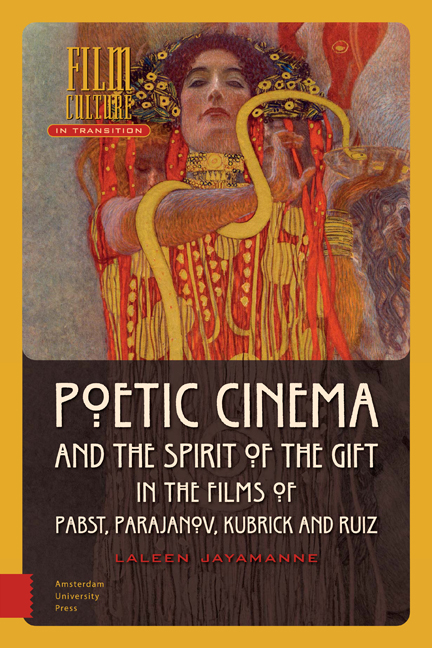Book contents
- Frontmatter
- Dedication
- Contents
- Foreword: In Memory of Thomas Elsaesser
- Introduction: Spirit of the Gift: Cinematic Reciprocity
- 1 A Gift Economy: G. W. Pabst’s Pandora’s Box (1929)
- 2 Fabric of Thought: Sergei Parajanov
- 3 Nicole Kidman in Blue Light: Stanley Kubrick’s Eyes Wide Shut (1999)
- 4 Ornamentation and Pathology: Raúl Ruiz’s Klimt (2006)
- Afterword: Poetics of Film Pedagogy
- Bibliography
- Filmography
- About the Author
- Index
1 - A Gift Economy: G. W. Pabst’s Pandora’s Box (1929)
Published online by Cambridge University Press: 13 April 2021
- Frontmatter
- Dedication
- Contents
- Foreword: In Memory of Thomas Elsaesser
- Introduction: Spirit of the Gift: Cinematic Reciprocity
- 1 A Gift Economy: G. W. Pabst’s Pandora’s Box (1929)
- 2 Fabric of Thought: Sergei Parajanov
- 3 Nicole Kidman in Blue Light: Stanley Kubrick’s Eyes Wide Shut (1999)
- 4 Ornamentation and Pathology: Raúl Ruiz’s Klimt (2006)
- Afterword: Poetics of Film Pedagogy
- Bibliography
- Filmography
- About the Author
- Index
Summary
Abstract
The first chapter offers a fresh approach to this canonical silent film by focusing on Louise Brooks's kinetic performance as Lulu and the tradition of dance and abstract movements she draws on. The early twentieth-century feminist political slogan, the ‘New Woman’, is embodied, contested, and rendered ambiguous in this late Weimar silent film through Brooks's technical skills as a modern dancer. Pabst and Brooks as co-creators draw an intimate link between the dynamism of the silent-film image and that of Lulu as dancer. I see these as a gift to the rather sedentary female scholar of cinema.
Keywords: Pabst and abstraction, Louise Brooks's acting as dance, New Woman
In primitive archaic type societies what is the principle whereby the gift has to be repaid? What force is there in the thing given which compels the recipient to make a return?
Actor and Prostitute
The etymology of the Greek name ‘Pandora’ (a composite of ‘pan’, meaning ‘all’, and ‘doron’ meaning ‘gift’) resonates with the German film Pandora's Box (1929) by G. W. Pabst and starring Louise Brooks as Lulu. As a prostitute and dancer, Lulu circulates across class barriers as well as those of gender and ethnicity with the splendour of an abundant, radiant gift. The clichéd narrative of the film may be summarized simply as the tragic fate of a prostitute, Lulu, who unwittingly causes death and destruction among the men she encounters, and who ends up dying at the hands of Jack the Ripper. But the images in the film, their lighting, Lulu's movements as a dancer, and the clothes and costumes she wears produce a parallel film which makes this clichéd narrative line waver, producing sensations and affects that are singular and memorable across nearly a century. This chapter examines these unique elements and the conflicting images of femininity they produce.
Although Lulu is a prostitute, a variety performer (a trapeze artist), and a dancer in a review – in other words, she is engaged in a system of exchange involving her body – she seems to exceed the terms of those commodified, quantifiable transactions based on a system of monetary equivalence. She does not recognize herself as a commodity. The most explicit example occurs on the gambling ship when Marquis Casti-Piani bargains with the Egyptian slave trader as to Lulu's exact worth, her monetary value.
- Type
- Chapter
- Information
- Poetic Cinema and the Spirit of the Gift in the Films of Pabst, Parajanov, Kubrick and Ruiz , pp. 23 - 54Publisher: Amsterdam University PressPrint publication year: 2021



